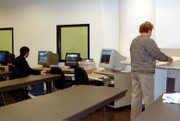Gaining Easier Access to Technology at FBI
Technology can sometimes be an intangible resource for small and start-up apparel companies, given its cost and often high learning curve. Los Angeles–based apparel industry association Fashion Business Inc., with the help of some of its corporate members, is trying to tear down those barriers.
The trade organization opened a new resource center last summer at The New Mart building in downtown Los Angeles’ Fashion District. The new center houses state-of-the-art design and production wares, meeting spaces, and showrooms for Southern California’s many start-up apparel companies. The nonprofit organization, which helps apparel designers and other production staff garner business skills, has been boosting its investment in technology.
FBI recently received an infusion of computers, software, plotters and digitizers, thanks to companies including Tukatech Inc., AIMS and Gerber Technology Inc. Visitors now have access to CAD design stations, ink-jet plotters, digitizing tables, labeling equipment and a photography studio.
With the new equipment, FBI can expand its educational programs in computer-aided design and other production skills.
“It’s for understanding the basics,” said Frances Harder, FBI’s president. “We’re trying to help them recreate blocks from existing garments and go from there.”
The first seminar, conducted in February, was deemed a success. Visitors learned how to “knock off” a garment using Tukatech’s CAD product. Harder said interest came not only from young designers and companies but also from established designers and merchandisers looking for recurrent training. The event was the first of a series.
The center also doubles as a TukaCenter, giving industry workers opportunities to rent equipment at nominal fees. The stations have access to TukaWeb, Tukatech’s Internet-based production service, which allows users to upload files to process markers, do grading and even get samples processed at cut-rate fees.
“Outsourcing in the garment industry has grown so much, and there’s a big need for this,” said Tukatech Chief Executive Officer Ram Sareen. “A lot of companies don’t have enough people to keep up with all the product specs. There are so many more styles to produce now. Yet, buyers are buying smaller quantities.”
While Tukatech’s equipment handles the production side of the apparel business, AIMS’ order management software handles the business side
“They don’t teach a lot of this side of the business in the design schools,” explained Henry Cherner, an FBI board of advisors member and co-founder of AIMS. “We want to give them the tools to better learn the business side of the apparel business.”
Cherner will conduct demos and seminars covering business management and EDI (electronic data interchange) and has launched a Web-based version of AIMS that allows small companies to use business management programs via the Internet for a manageable monthly fee, rather than paying more than $4,000 for the complete program.
AIMS’ program covers invoicing, order management, cost sheets, bills of materials, credits and returns, and UPC and bar codes. It also integrates with EDI and other accounting programs, such as Intuit’s QuickBooks.
Participation from private companies continues to filter in. Color forecaster Design Option, a new FBI member, is donating yarn boxes for new subscribers. Malibu, Calif.–based Shapely Shadow Inc. recently donated a cyber dress form to help students learn the art of sizing. The form was originally developed from a 3-D laser scan of a Kenneth Cole fit model.
“We’re trying to communicate how fit develops brand loyalty and how [students can] develop a niche and develop a target market,” said Shapely Shadow Chief Executive Officer Ilona Foyer.
Next month, Los Angeles–based Progressive Label Inc. will donate label-printing hardware to the center. And a new photography studio is allowing FBI members to produce line sheets, catalogs and other tools for sales and marketing.
Harder said the resource center is the perfect example of how the public and private sectors can create a win-win situation. The city of Los Angeles and the Department of Water and Power financed planning and construction of the center. The Eisenberg Trust, owner of The New Mart, donated five years of free rent.






















